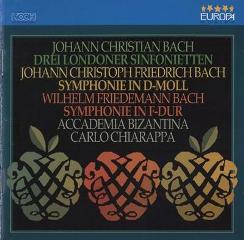J.C., J.C.F., W.F. Bach – Sinfonie (1991)
J.C., J.C.F., W.F. Bach – Sinfonie (1991)

Johann Christian Bach – Drei Londoner Sinfonietten Nr.1 in A-Dur 1. Allegro 2. Rondo grazioso Nr.2 in D-Dur 3. Andante 4. Menuett Nr.3 in C-Dur 5. Allegro 6. Rondo grazioso Johann Christoph Friedrich Bach Symphonie in d-moll 7. Allegro 8. Andante amoroso 9. Allegro assai Wilhelm Friedemann Bach Symphonie in F-Dur 10. Vivace 11. Adagio 12. Allegro 13. Andante 14. Allegro 15. Menuetto 1 16. Menueto 2 Accademia Bizantina Carlo Chiarappa – conductor
The 11th son of Johann Sebastian Bach and the youngest to live to maturity, Johann Christian received his early musical training from his father, than whom music has spawned no greater genius. When Christian was fourteen his father died. Thereupon he studied with his brother Carl Philipp Emanuel. Four years later he left for Italy, where he continued his studies and won a patron. Eventually he became organist at the cathedral of Milan and began to compose operas, economically the most rewarding of compositional forms in those days. In 1762 he emigrated to London, his home until his death 20 years later. The "London" Bach achieved immediate renown in England, and within two years was appointed music master to the Queen. Until his health failed, he was the co-organizer (with Carl Abel) of an acclaimed series of London concerts that took place over two decades.
Bach departed from the musical style of his father and older brothers, anticipating and indeed contributing to the development of the so-called "classical" era. His tendencies include a new emphasis on emotional expression, a shift from ecclesiastical to concert-hall forms and genres, and a conscious featuring of virtuoso instrumental registration. His work embodies the "style galant" of the last half of the 18th Century. Besides his many operas and chamber compositions, Bach wrote around 90 symphonies, productivity akin to that of Haydn. Had Johann Christian's father J.S. Bach never existed, Johann Christian's place in musical history would be secure. So profound and excellent were his talents and knowledge, the child prodigy Wolfgang Mozart was brought to him in London in 1764 for instruction. Mozart acknowledged his debt to his mentor by using several of Bach's piano sonatas as the bases for his own early piano concertos. --- Douglas Purl, classical.net
Johann Christoph Friedrich Bach, (born June 21, 1732, Leipzig—died Jan. 26, 1795, Bückeburg, Prussia), longest surviving son of J.S. and Anna Magdalena Bach.
Probably educated by his father’s cousin Johann Elias Bach, J.C.F. Bach became a chamber musician to Count Wilhelm at Bückeburg in 1750, and was appointed concertmaster 1759. His career was steady and his output of compositions extensive. He made a successful transition from the late Baroque style into the early Classical style. His compositions were well received, and although they did not lead their times, they kept successfully abreast of them. He is at his best in his later symphonies, similar in style to those of Haydn. He also composed motets, oratorios (some in collaboration with the poet Johann Gottfried von Herder), sonatas and other works for keyboard, chamber cantatas, and instrumental chamber works. --- britannica.com
Wilhelm Friedemann Bach, (born Nov. 22, 1710, Weimar, Saxe-Weimar—died July 1, 1784, Berlin), eldest son of J.S. and Maria Barbara Bach, composer during the period of transition between Baroque and Rococo styles.
W.F. Bach’s musical instruction was primarily from his father (who wrote for him, when he was ten, the charming Klavier-büchlein vor Wilhelm Friedemann Bach of keyboard pieces). He also studied the violin. He matriculated at Leipzig University in 1729. In 1733, already composing extensively, he was appointed organist to the Church of St. Sophia in Dresden. In 1746 he moved to the Liebfrauenkirche at Halle. At about this time, or perhaps later, after his father’s death in 1750, he seemed to begin to have personality difficulties, evidenced by excessive drinking and other lapses. After a late marriage in 1751, he became restless and applied unsuccessfully for a change of post in 1753 and 1758. In 1762 he won an appointment to the Darmstadt court but did not take it up. Resigning his old post in Halle in 1764, for 20 years he sought in vain for regular employment. He became touchy and unreliable, and although his talents were never doubted, he imagined that they were. In 1774 he moved to Berlin, where he lived meagrely by giving recitals and teaching.
Of his compositions, keyboard works and cantatas form the larger part; he also composed several symphonies and chamber works and an opera. His music vacillated between the Baroque style of his father and the newer galant, or Rococo, style. His compositions, few for his many years, are often impassioned, often unpredictable in their use of melody, harmony, and rhythm. --- britannica.com
download: uploaded anonfiles mega 4shared mixturecloud yandex mediafire ziddu
Zmieniony (Niedziela, 04 Sierpień 2013 23:39)








